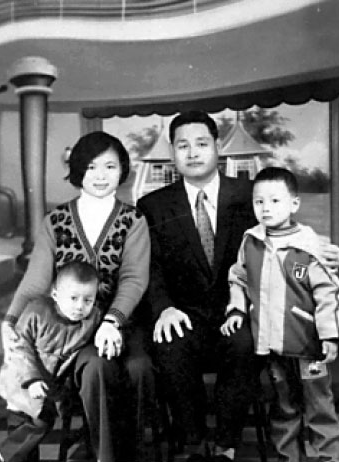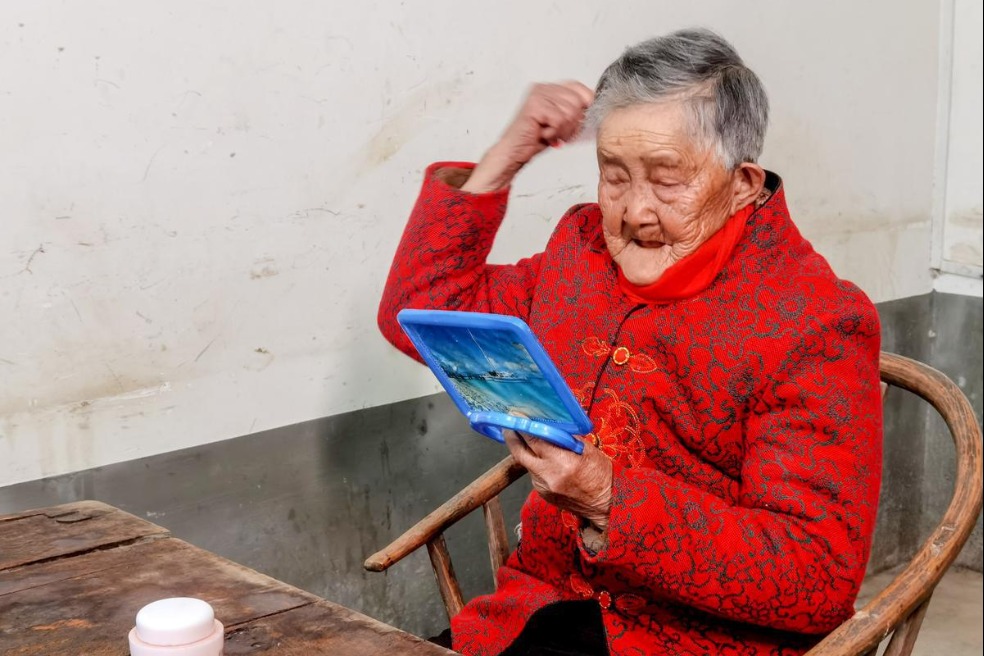Family reunions prove that blood is thicker than water


Nearly 70 years after the Kuomintang regime's flight to Taiwan, the descendants of those who moved are attempting to discover their mainland roots, as Li Lei reports.
The end of the Chinese Civil War (1946-49) saw an estimated 1 million soldiers and civilians loyal to the Nationalist Kuomintang flee the Chinese mainland and decamp to Taiwan.
Nearly four decades of confrontation followed, and cross-Straits relations only began to thaw in the late 1980s.
However, when Taiwan allowed members of the so-called displaced generation to visit the mainland after 38 years, many were unable to locate their long-lost relatives.
Now, as members of the original group begin to die off, many of their descendants are attempting to find their families in the mainland.
Fang Chih-peng, a 45-year-old lecturer in tourism and leisure management at the China University of Technology in Hsinchu, Taiwan, is part of the younger generation that has reconnected with family members across the Taiwan Straits.
"My mother told me that if my father had lived to see the day when people in Taiwan were allowed to visit their relatives in the mainland, he would have been the first to purchase a ticket and go home," he said.
In 1949, Fang's grandfather, a grain retailer in Nanjing, Jiangsu province - the capital under the Kuomintang - asked a relative in the Nationalist army to look after his 12-year-old son Fang Decai, who was later to become the father of Fang Chih-peng.
The boy was taken to Taiwan as the Kuomintang retreated, but his father promised they would be reunited when peace was restored. However, Fang Decai, who died in 1975, never saw the mainland again.
"For my father, going home was out of the question," said Fang Chihpeng. "My father died when I was age 2, but later, the idea came to me to honor him by finding our relatives in the mainland."
Fang Chih-peng began searching in 2010, but it wasn't until seven years later, in December, that he finally located two elderly uncles - the youngest was 71 - and two aunts in Nanjing.
The breakthrough came after Fang Chih-peng saw a television report about Jinri Toutiao, a news aggregator app that had started a program to help displaced Kuomintang members and their descendants in Taiwan reconnect with relatives in the mainland.
The app sent messages from Taiwan residents to users in the mainland asking for information about the likely whereabouts of potential relatives and requesting details of possible family links.
Fang Chih-peng struck gold when an alert was sent to users in parts of Anhui and Jiangsu provinces, where he believed his relatives were living. Confirmation of the existence of family members in Nanjing came just four hours after the message was sent out.
He was delighted by the response. Not only had he achieved his father's desire to reunite the family, but he had answered a question that had been bothering him for years - "Where do I come from?"
"Now I can speak with confidence when my children ask me that question and I can tell them the history of their bloodline," he said.
According to Jinri Toutiao, all 50 Taiwan residents who asked for help are descendants of people who moved in 1949, and more than 60 percent of the older generation has already died.

Fraught atmosphere
Following the retreat to Taiwan in 1949, the defeated Kuomintang pledged to launch a counterattack against the mainland within five years.
In preparation for the attack, junior soldiers in the army - many of whom were in their early 20s - were forbidden from marrying to ensure that they were focused on the task ahead. The atmosphere became so fraught that Taiwan residents who attempted to cross the Straits could be charged with spying for the mainland, an offence that carried the death penalty.
However, the disparity in military strength meant the attack never materialized. Meanwhile, as the young soldiers aged and were released from military service, they found themselves living alone. To make matters worse, most were on the bottom rung of the social ladder and lacked financial security.
In 1979, as the reform and opening-up policy began to make a mark, the mainland published an open letter to Taiwan calling for an end to confrontation and suggesting direct cross-Straits links for transportation, mail and trade.
In the 1980s, a wave of "go-home movements" launched by homesick veterans and civilians - many of them unmarried 60-somethings - pressured the authorities in Taiwan to rethink the decades-old policy of isolation. As a result, in 1987, Taiwan residents were finally allowed to travel to the mainland to visit relatives.
However, most of those who had relocated in 1949 - along with Chinese soldiers who were sent to the island after being captured during the Korean War - were unable to return home, according to Xia Hengfang, who heads a program run by the Shenzhen Longyue Charity Foundation, a mainland NGO that helps veterans and their relatives in Taiwan find their families.
"Even after they were allowed to visit the mainland, many failed to return due to a variety of reasons," she said.
"Some could not afford the trip; some had remarried on the island and were afraid to face their families on the mainland; while others were daunted by the political bias in Taiwan against the mainland."
Now the older generation is beginning to die off, Xia is not surprised that their descendants are taking up the baton to reunite with their relatives on the mainland.
"'Who am I and where I am from?' These are questions that trouble many of the younger generation born and raised in a nostalgic environment in Taiwan," she said.
Chou Sz-yu, a 27-year-old from Taiwan who lives in Beijing, is the head of Jinri Toutiao's "family reunion" program.
She said many homesick veterans died before they were allowed to return to the mainland, but their dying wish was that their children should make the trip when circumstances allowed.
"More than three decades have passed since Taiwan residents were allowed to visit the mainland, and the bias against the mainland has abated as cross-Straits communication widens and deepens," she said.
Some of those who relocated visited the mainland after the ban was lifted, but failed to keep in touch.
"After they die, their children will want to re-establish Cross-Straits relations," Chou said.
'Impulse to return'
Xia, from the Longyue charity, said traditional culture is still paramount in Taiwan, and people attach great importance to maintaining their bloodline and respect for their native soil.
She is confident that interpersonal connections across the Straits will not be severed as the older members of the relocated population die. "The impulse to return home is in the genes of many of the younger generation in Taiwan," she said.
While Tang Yonghong, deputy director of the Taiwan Research Center at Xiamen University, Fujian province, echoed Xia's comments, he expressed concerns about Taipei's propaganda program and its education system, which advocates independence for the island.
"Given that the younger generations have very few shared experiences with their mainland compatriots, these messages could be quite misleading," he said.
Despite the uncertainty about the future, Fang Chih-peng is still basking in the glow of his recent reunion with his long-lost family.
For him, the cross-Straits relationship is like the one that exists between distant relatives. "The key to keeping it healthy and robust is to maintain it through greater interaction," he said.
- 4th TCTCP established: boosting standards for tropical agriculture
- Quzhou emerges as a cultural and tourism destination
- Shanghai sees surge in international arrivals
- Former Moutai chairman under investigation for misconduct
- Shanghai railway staff becomes popular with rapid typing, spoken English
- Giant pandas celebrate first year in Chongqing with snowy spectacle





































